 Petzlover
Petzlover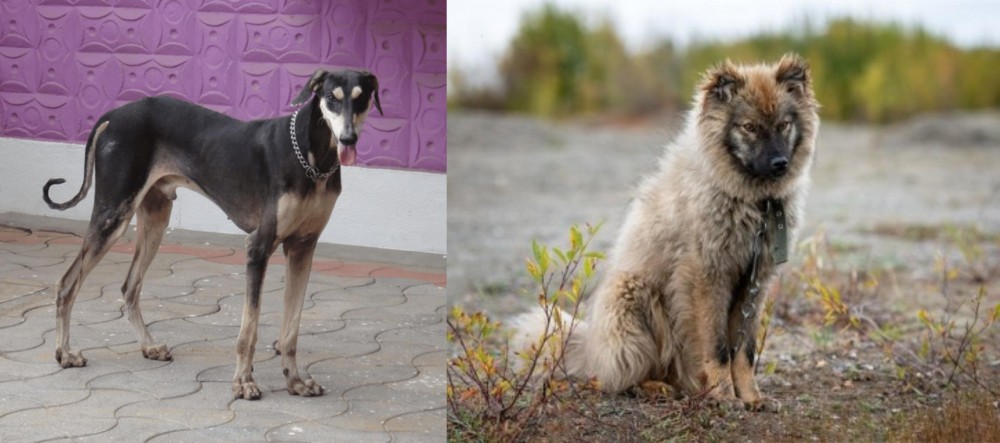 Kanni is originated from India but Nenets Herding Laika is originated from Russia. Kanni may grow 9 cm / 4 inches higher than Nenets Herding Laika. Kanni may weigh 7 kg / 15 pounds lesser than Nenets Herding Laika. Kanni may live 3 years more than Nenets Herding Laika. Both Kanni and Nenets Herding Laika has almost same litter size. Kanni requires Low Maintenance. But Nenets Herding Laika requires High Maintenance
Kanni is originated from India but Nenets Herding Laika is originated from Russia. Kanni may grow 9 cm / 4 inches higher than Nenets Herding Laika. Kanni may weigh 7 kg / 15 pounds lesser than Nenets Herding Laika. Kanni may live 3 years more than Nenets Herding Laika. Both Kanni and Nenets Herding Laika has almost same litter size. Kanni requires Low Maintenance. But Nenets Herding Laika requires High Maintenance
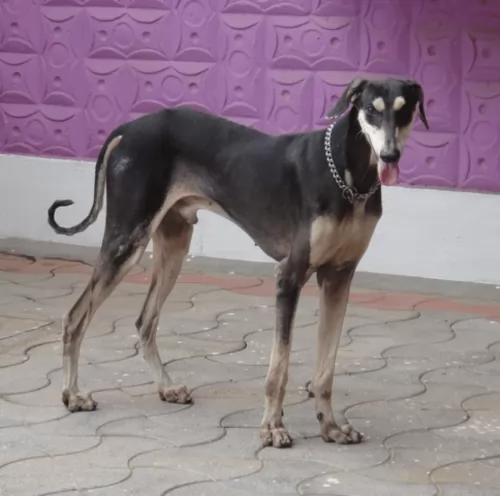 The Kanni dog is a rare South Indian Sighthound. It is also known as the Maiden's Beastmaster and this is because it is known to be protector and defender of its owner's property.
The Kanni dog is a rare South Indian Sighthound. It is also known as the Maiden's Beastmaster and this is because it is known to be protector and defender of its owner's property.
During ancient times, the dog was used for hunting but today it is essentially kept as a pet and it is registered with the Kennel Club of India.
 There is a large variety of Laika dogs as the word is almost a generic term for a type of Russian hunting dog. They are found in Northern Russia and Siberia and there are several recognized by the Federation Cynologique International including the East Siberian Laika, the Russian European Laika, and the West Siberian Laika. These Siberia Laika are crosses between the aboriginal dogs of Siberia and northern Russia. The word Laika means a barking dog and comes from the word meaning to bark. These laikas are working dogs, hunting pointers that were bred specifically for their barks.
There is a large variety of Laika dogs as the word is almost a generic term for a type of Russian hunting dog. They are found in Northern Russia and Siberia and there are several recognized by the Federation Cynologique International including the East Siberian Laika, the Russian European Laika, and the West Siberian Laika. These Siberia Laika are crosses between the aboriginal dogs of Siberia and northern Russia. The word Laika means a barking dog and comes from the word meaning to bark. These laikas are working dogs, hunting pointers that were bred specifically for their barks.
All the dogs in this category are loyal and affectionate. They are hard workers and hunters/herders and sled dogs. Of the official Laika groups including the Nenets Herding Laika, there is the Karelo-Finnish Laika, the Northeasterly Siberian Laika, the West Siberian Laika, The Russian European Laika, Eastern Siberian Laika. The Laika are wary of strangers, noisy and rowdy.
The Laika breed known as the Nenets Herding Laika is also called the Reindeer Herding Laika. The breed is pretty ancient, developed by the Nentry tribe at about the same time that the nomads were developing the Samoyed. Like the Samoyed breed, the Nenets Herding Laika herded Reindeer. The artic breed originates from Russia and can be used for transportation and hauling as well.
While their temperament and history are very much the same as the Samoyed, they are recognized as separate breeds. However there are many aficionados of both breeds believe that the Samoyed and the Nenets Herding Laika are the same breed. For many the Samoyed are simply a white version of the Nenets Herding Laika.
The Nenets Herding Laika is also know as the Samoyed Laika, so you can see how close if not the same, these two breeds are. The Nenets Herding Laika was bred by the Nenet peoples. The Samoyed is all white while the Nenets is any variation of black, gray, piebald, red, white, sable and brown.
The dogs herd and guard reindeer, keeping the herd together and moving them from one pasture to another. They will also stay with a stray reindeer until they are found. They will do this whether they have food or water. They will bark to try to bring the people’s attention to the lost reindeer. They are also an excellent hunting and retrieving, swimming dog.
The Nenets are also known as Yurak Samoyeds and they are the largest group of Samoyedic peoples today. They live on both sides of Russian Ural Mountains in northern Russia and the Yamal Peninsula. They move large herds of reindeer to the winter lands south of the Artic Circle from the north – about 600-900 miles. It is believed that the Herding Laika originated with this group of people but spread beyond them. They were shipped to far northeast Siberia to be bred and shared with reindeer herding tribes there.
There is a longhaired or rough coated variety and a shorthaired variety. The Nenets consider the work routine of both varieties the same, but they believed that the shorthaired version was a more ancient than the longhaired version.
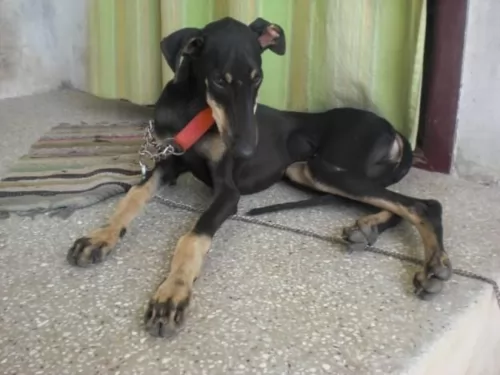 These dogs are tall, slim and deep chested, coming in two-color combinations, but it is the black and tan variety that is the true Kanni. There is also a cream variety. There are other color variations and each color has a unique name connected to it. The coat of the Kanni is short and smooth.
These dogs are tall, slim and deep chested, coming in two-color combinations, but it is the black and tan variety that is the true Kanni. There is also a cream variety. There are other color variations and each color has a unique name connected to it. The coat of the Kanni is short and smooth.
They are medium sized dogs standing at 62 to 67cm at the withers and weighing in the region of 18 – 22kg. When you first look at these dogs you might think of them as being similar to a Greyhound in looks. This is also because of their lean, muscular looks.
The eyes are a golden color, the nose black and the ears are a medium size and floppy with the long tail being semi-curved.
The Kanni has always been a hunting dog so he is used to being sharp, strong-willed, independent and alert as well as having some aggressive tendencies. It is also quite a reserved dog but he shows love and loyalty to his owner. He is independent and easy to train. It is a good thing to have him trained and socialized so that he is obedient to the simple commands you give him.
 This is a medium sized dog , muscular and strong. Slightly smaller than the Samoyed, the Nenets Laika weighs about 40-55 pounds and is 18 inches tall. The ears are typical Spitz ears and the tail is carried up over the back. The Nenets Herding Laika can have gray, piebald, black or tan coats and some can be solid white and look just like a Samoyed. The coat is a thick, double coat with the undercoat very wooly.
This is a medium sized dog , muscular and strong. Slightly smaller than the Samoyed, the Nenets Laika weighs about 40-55 pounds and is 18 inches tall. The ears are typical Spitz ears and the tail is carried up over the back. The Nenets Herding Laika can have gray, piebald, black or tan coats and some can be solid white and look just like a Samoyed. The coat is a thick, double coat with the undercoat very wooly.
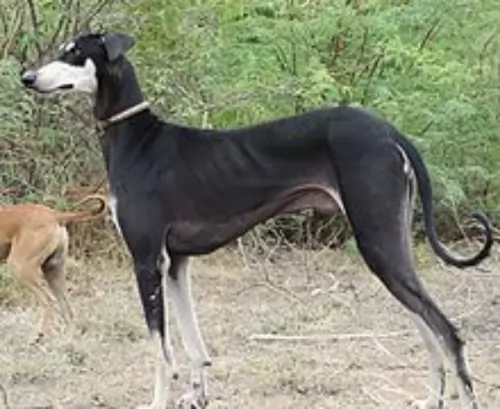 The Kanni looks much like your regular Doberman Pinscher but he has long tail and floppy ears. He is slim and agile but also powerful being able to have bursts of speed. It is why he requires a large place to run and play in, being better suited to a home with a large garden or farm.
The Kanni looks much like your regular Doberman Pinscher but he has long tail and floppy ears. He is slim and agile but also powerful being able to have bursts of speed. It is why he requires a large place to run and play in, being better suited to a home with a large garden or farm.
He is a playful, quiet dog but he has quite a bark on him and is known to be a good watchdog because of this. He is a protective dog too, devoted and loyal and making a splendid family pet.
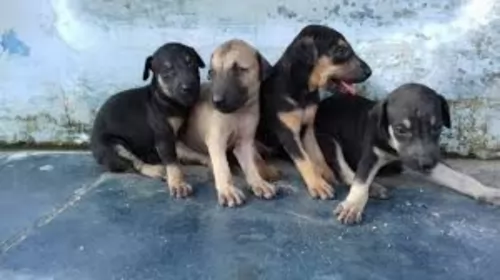 Not much is known about inherited health problems in this breed, and he can live up to a ripe old age of 16. It seems a pretty healthy dog, but still it helps to be aware of some of the more common dog illnesses that your pet can succumb to.
Not much is known about inherited health problems in this breed, and he can live up to a ripe old age of 16. It seems a pretty healthy dog, but still it helps to be aware of some of the more common dog illnesses that your pet can succumb to.
For first time dog owners it can be difficult knowing what health problems our beloved pets could suffer from. Every dog breed has certain diseases to which they are more prone to, but these are some common issues that most of our 4-legged friends will face -
This is a common dog health problem in India with the Kanni. There are so many things that disagree with their digestion. Most dogs may not want to eat their next meal, but when he is lethargic, he is hot and is vomiting, it is time to get your pet to the vet. This is because diarrhea causes rapid dehydration in dogs. To avoid diarrhea, steer clear of certain foods such as milk and dairy products as well as old, spoiled fatty foods. With diarrhea your dog must always have access to fresh, cool water.
This is a common dog disease, and ear infections can be painful and frustrating for your pet. He’ll scratch at his ear, shake his head and the inside of the ear may be red with a discharge. Check his ears for redness and try to keep them free from wax build up and dust.
Cleaning the ear is quite simple, and if you’re not sure how, the vet can do it quickly and effectively. Usually some dog ear cleaning solution on some cotton wool can do the trick. Ear infections are common in dogs like the Kanni with floppy ears.
It is essential to control fleas on your dog from word go. Fleas thrive in warm temperature and humidity and your pet will scratch, bite and lick at the spot. When you brush your pet, look through his fur for fleas and tell you vet about it if you discover ticks and fleas. A topical ointment could nip the problem in the bud. You may want to consider a flea collar for your pet.
Tapeworms, hookworms and roundworms for instance are commonly found in dogs, and even for healthy dogs, deworming tablets should be given from time to time. If your dog has worms, you’ll notice lethargy, loss of appetite, diarrhea and vomiting. It may be time to get your pet to the vet.
 For the most part the Nenets Herding Laika is a healthy breed and very hardy. They do however have some propensities for some illnesses and conditions.
For the most part the Nenets Herding Laika is a healthy breed and very hardy. They do however have some propensities for some illnesses and conditions.
Diabetes Mellitus – can be treated with medication and is usual seen in middle age -after 7 years of age.
PRA – Progressive Retinal Atrophy – Slow loss of vision and this is a genetic disease – leads to blindness.
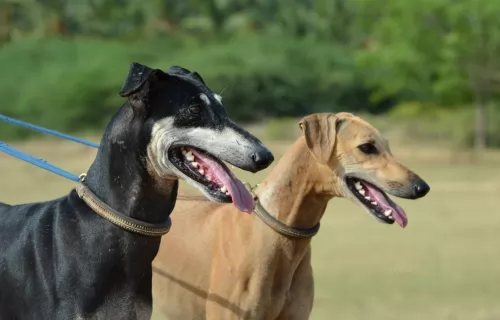 The Kanni is a low maintenance dog with his short coat. You can give him a good brush twice a week, check that his nails don't grow too long and also check his ears inside and out. Ticks and fleas are rife in hot weather and you want to give your dog a thorough check for these. You should also be checking your dog's teeth and brushing them 2 or 3 times a week. Dental problems can cause havoc with your dog's health.
The Kanni is a low maintenance dog with his short coat. You can give him a good brush twice a week, check that his nails don't grow too long and also check his ears inside and out. Ticks and fleas are rife in hot weather and you want to give your dog a thorough check for these. You should also be checking your dog's teeth and brushing them 2 or 3 times a week. Dental problems can cause havoc with your dog's health.
As a hunting breed, the Kanni is used to running so his needs for a good amount of exercise are quite high. While they do make good family pets, they hanker after wide open spaces and being busy. If you own one of these dogs, make sure that you exercise him often because otherwise he becomes frustrated and unhappy.
This dog has always been used to village life where he is free to roam wide open spaces. He is much more suited to country life than to city life, and as a pet, you will need to ensure that he receives a good amount of exercise.
Take him for walks, and if he's been socialized and trained, take him to the park and allow him off his leash to run.
The dog has always been fed traditional food such as porridge and milk but we know better now that dogs need protein too as well as a diet rich in vitamins and minerals to ensure his health.
You can feed him a top quality commercially manufactured dog food and add in some cooked chicken, rice and vegetables from time to time. It is expensive, but if you can, try and add in some raw meat occasionally as well. Your Kanni dog must always have access to fresh, clean water.
 Be careful that your pup doesn’t grow too fast. They are open to injuries if they grow too fast. Low calorie with protein and not a lot of fat. half a cup of high quality medium breed dog food 3X a day.
Be careful that your pup doesn’t grow too fast. They are open to injuries if they grow too fast. Low calorie with protein and not a lot of fat. half a cup of high quality medium breed dog food 3X a day.
1 1/2 cups high quality medium breed dog food.
athletic and agile
At leaset a walk or two every day. Don’t get overheated as they are used to cold weather. Would be good at agility and herding exercise.